
The Lok Sabha elections in India are the largest democratic exercise in the world, where millions of eligible voters head to the polls to elect members of the Lok Sabha, the lower house of the Indian Parliament. With the 2024 Lok Sabha elections on the horizon, it is vital for citizens to understand the significance, process, and key aspects of this electoral event.
Understanding Lok Sabha Elections
The Lok Sabha, also known as the House of the People, is composed of representatives elected by the people on the basis of universal adult suffrage. The Lok Sabha members are responsible for representing the views and aspirations of the people in the Parliament. The Lok Sabha elections play a crucial role in shaping the destiny of the country by determining which political party or coalition will form the government.
Key Features of Lok Sabha Elections
-
Election Commission: The Election Commission of India is the constitutional body responsible for the conduct of free and fair elections in the country. It plays a crucial role in overseeing the entire electoral process.
-
Constituencies: India is divided into parliamentary constituencies, each of which elects one member to the Lok Sabha. The total number of seats in the Lok Sabha is 545, with 543 elected members and 2 nominated members.
-
Voting Eligibility: To vote in the Lok Sabha elections, an individual must be an Indian citizen, be at least 18 years old, and be registered as a voter.
-
Electoral System: The Lok Sabha elections in India follow the first-past-the-post system, where the candidate with the highest number of votes in a constituency is declared the winner.
-
Political Parties: Various political parties in India field candidates to contest the Lok Sabha elections. The party or coalition that secures a majority of seats forms the government.
-
Campaigning: Political parties and candidates engage in extensive campaigning through rallies, speeches, door-to-door campaigns, and media advertisements to woo voters.
Process of Lok Sabha Elections
The Lok Sabha elections are conducted in several phases spread across multiple days to ensure a smooth and orderly voting process. The key steps involved in the Lok Sabha election process include:
1. Election Schedule
- The Election Commission announces the election schedule, detailing the phases of voting in different states and union territories.
2. Nomination of Candidates
- Political parties and independent candidates nominate their candidates for each parliamentary constituency.
3. Campaigning Period
- Candidates and political parties campaign vigorously to reach out to voters and present their manifestos and promises.
4. Polling Day
- On the designated polling days, voters in each constituency cast their votes in electronic voting machines (EVMs) or through postal ballots.
5. Vote Counting
- After the completion of all phases of polling, the votes are counted, and the results are declared for each constituency.
6. Formation of Government
- The political party or coalition that secures a majority of seats in the Lok Sabha goes on to form the government.
Importance of Lok Sabha Elections
The Lok Sabha elections hold immense significance for the Indian democracy and its citizens. Some key reasons why Lok Sabha elections are crucial include:
1. Democratic Representation
- The elections enable citizens to choose their representatives who will voice their concerns and issues in the Parliament.
2. Policy Formulation
- The government formed after the elections is responsible for formulating and implementing key policies that impact the country’s development and welfare.
3. Accountability
- Through elections, citizens hold elected representatives accountable for their actions and decisions taken on behalf of the people.
4. Stability and Governance
- A stable government formed post-elections ensures smooth governance and policy continuity, promoting economic and social progress.
Frequently Asked Questions (FAQs)
1. When are the Lok Sabha elections scheduled for 2024?
- The exact dates for the 2024 Lok Sabha elections have not been announced yet. The Election Commission will declare the schedule closer to the election year.
2. How can I register to vote in the Lok Sabha elections?
- Eligible citizens can register to vote by filling out Form 6 online on the Election Commission’s website or by visiting the nearest Electoral Registration Office.
3. What documents are required to vote in the Lok Sabha elections?
- Voters need a valid Voter ID card or any other approved identification document such as Aadhar card, passport, or driving license to cast their votes.
4. Can Non-Resident Indians (NRIs) vote in the Lok Sabha elections?
- NRIs are not eligible to vote in the Lok Sabha elections unless they are registered as voters residing in India.
5. Are there any restrictions on campaigning during the Lok Sabha elections?
- Campaigning rules and regulations are set by the Election Commission, which governs the timing, spending limits, and conduct of political campaigns.
In conclusion, the Lok Sabha elections are a cornerstone of Indian democracy, providing citizens with the power to shape the future of the country through their votes. As the 2024 Lok Sabha elections approach, it is crucial for every eligible voter to actively participate in the electoral process and make an informed choice for a better and brighter India.

